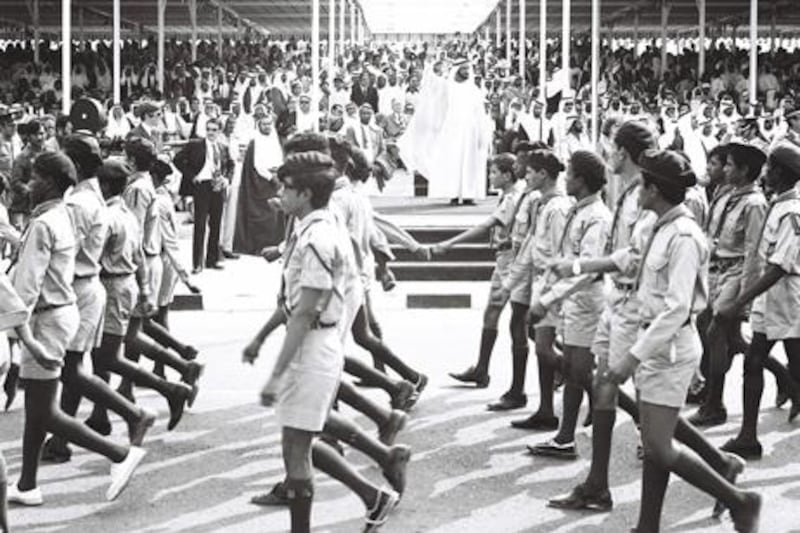Saeed Bkheet Salem Al Mansoori, born in 1966 in Baynunah
"We saw Sheikh Zayed a lot. He created competitions, attended parties and went on hunting trips.
"There were fewer cars so we didn't have the parades, like they do today. It was a couple of streets only. As I remember the street illuminations began in the 1980s. People were really thrilled because of the union. Every year, as the people felt their lives had changed for the better and how the land had become one and that this was their country, they held the idea of Ittihad.
"The celebrations, I think, are just an appearance, but what is really important and real is that Zayed did a great thing. Even the greatest celebrations do not pay this what it fully deserves. Ittihad has changed the lives of everyone here, and those who witnessed what happened in the past can appreciate what is happening now."
Ahmed bin Huwaiden Al Ketbi, 34, from Abu Dhabi
"National Day celebrations aren't the same as they used to be when I was younger. They weren't as organised and coordinated as they are now.
People in the old days celebrated their own way. In schools, we used to make drawings about the occasion, play traditional music, carry flags and participate in student parades. Older citizens' celebrations were more traditional.
They brought folk bands to perform local, traditional shows. They also prepared traditional feasts in public places. The festivities were more spontaneous back then and mostly technology-free."
Kelfan Matar Al Muheiri, 32, from Abu Dhabi
"National Day celebrations have evolved throughout the years. From the late 1980s, all the streets of the emirate, especially the Abu Dhabi Corniche, would be decorated with lights and flags. My fondest memory is of the various parades that took place on the day.
There were military parades, followed by parades with camels, Bedouins and everything related to them. Then came the seafaring people's parades that showcased the fishing nets and equipment used at sea, also the farmers' parades where you could see traditional farming tools and date palm trees.
What made those parades special is that they expressed the homogeneity and the solidarity among all Emirati society, which was the result of the union of course."
Ahmed Omar was born in 1960 in Sharjah and moved to Abu Dhabi when he was three
"Ittihad celebrations always gave everyone a feeling of happiness, and although they were more formal at the start, with the passing of time it has become more fun and more heartfelt. Now it is getting more creative and they start the celebrations several weeks before the actual date."
Jasem Obeid was born in 1952 and married in 1971. His eldest son was born in 1972. While working for Abu Dhabi TV, he became famous for playing a children's character, the bear "Dabdoob"
"Our children had a school play about a father who had seven children. He gave each child a stick and asked them to break it. Then he put a bundle of sticks in their hands that they could not even break. This father was Sheikh Zayed.
"In the early years we used to have a celebration like we have now on the Abu Dhabi Corniche, just on a smaller scale. The celebrations got bigger, developed with the country's development.
"Sheikh Zayed used to attend every national celebration during his life. And a lot of camel races were held. As young men, at the time, we used to gather at the heritage village in Al Bateen, and had 'samrat' - small parties late at night with socialising, poetry, music and swapping memories."
Latifah Abdulla Mohammed, 25, from Dubai
"National Day had a different feel to it when I was younger. I remember when I was in school, we used to prepare meticulously for the occasion. We applied henna, bought new clothes and rehearsed traditional Emirati dances."
Bushra Alkaff Al Hashemi and Ali Al Shamsi






